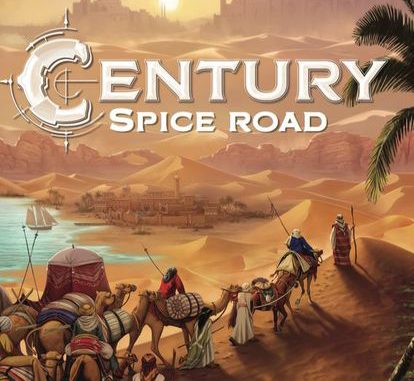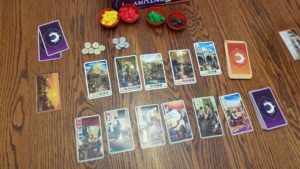
Century: Spice Road is a game about managing your resources in order to beat your fellow players to the most lucrative trade routes. The basic premise has you acquiring resources which you trade in to fulfill a victory cards demand. The person with the most victory points wins. Do you bide your time and grab the most lucrative trade routes? Or do you rush and be the first one to get all six and end the game?
Production- A
The cards all have well-done artwork. More importantly, they are designed effectively, conveying their mechanical effect without words. The resources themselves are simple cubes but they get a big thumbs up for being wood instead of plastic. You also get a set of metal coins which feel like actual coins. Wood or metal always just feels more solid.
What is plastic that also gives them strong kudos is that the game comes with four bowls for the four different resources. You are not required to dump the cubes onto the table or scrounge around for something to keep them in. We have a set of bowls we keep in our game room which are sometimes enough but often not enough for the different games we play. It’s always nice when the game provides everything you need.

One final note on production, the designers get high props for fitting all of the rules on a single page, front and back. Everything’s easy to find and understand.
Theme- C
The idea behind the game is that you are working the legendary spice road, gaining wealth and prestige as you travel across the world to lucrative markets. The card imagery conveys this and is appropriate. But, really, the theme plays almost no role in the game. One of the core mechanics, resource conversion, is intended to be you trading one resource for another. But you could be doing almost anything else.
Gamer Nation Studios (disclaimer: they also own d20 Radio) uses the same resource conversion idea with Eons. The theme works better there because when you’re converting the resources it’s a specific step you do every round. There you convert matter as part of solar fusion. As the game is about growing the cosmos, and that’s how different elements are created, it works really well. Here, you’re just playing a card and switching cubes. Mechanically, it’s great. Thematically, it’s meh.
Gameplay- B+
The game plays quickly, which is always a plus. On your turn, you have four choices and can only do one of them.
- Draw a market card (these are your hand which allow you to convert resources)
- Make a trade (play a card and convert resources from one type to another or gain new resources)
- Fulfill a demand (gain a victory point card by turning in the required resources)
- Rest (Pick up your played cards back into your hand)
The trick of the game is deciding when and how aggressively you want to go for the victory point cards. You start off with a hand of only two cards. Converting resources to get what you need will be tough with just those cards. Early on you want to acquire as many market cards as you can, giving you greater options and more cards that you can play before you have to spend a turn picking resting. Some cards just straight give you resources, some upgrade resources (resources are upgraded on a track of Yell0w to Red to Green to Brown), and some trade a certain set of colors for another set. Picking a set of cards that work together is half the battle.
The market cards are laid out in a line. The one at the front is free but you can pick any of the others by dropping one resource on each card you pass over. If a card comes up that makes a perfect combo with your other cards it can be worth the resources. But keep in mind, when those cards you passed on get picked up, the other players get those resources. A bad card at the front of the line will accumulate resources until it suddenly become valuable.
At some point, players will abandon the market game and start racing to acquire victory cards. The game ends at the end of the round that a player picks up their sixth* card. You don’t want to still be building your hand with market cards while the rest of the players are three victory cards in. You can race to pick cards up as quickly as possible, hoping to have more points through sheer magnitude of cards, or take the long approach and work your way to getting the big point cards. The cards range in value from 8 to 20 with the possibility of up to three bonus points.
There is always the chance of analysis paralysis but that’s not a failing of the game itself. With only one decision to make each round the game flows nicely. The main hold up will be deciding which victory card to try for, which requires keeping track of everyone else’s stock. Do you pick up this 11pt card now, which is in the gold bonus slot and will give you a bonus three extra points? Or do you hope another player nabs it, moving a 14pt card into the gold slot?
*I normally play with three players, which is six cards but that changes based on number of players).
Expansions- TBD
Century: Spice Road is part of a trilogy of games including Eastern Wonders and From Sand to Sea which combines the other two together. I have not played these yet so can not give an opinion on them.
Conclusion- B+
If you like a quick game with a straightforward premise, but that still presents you with a complex puzzle to figure out every time you play, Century: Spice Road might be for you.
Wayne Basta
Latest posts by Wayne Basta (see all)
- X-Wing Tier List – Rebels - May 10, 2023
